
by Sylvester Addo | Jan 26, 2015 | General, Internet, Windows
The Spartan is a single browser designed to work great across the entire Windows 10 device family – from keyboard and mouse on the Windows 10 desktop to touch, gestures, voice, controllers and sensors.

Microsoft’s project Spartan, the brand new browser announced at the Windows 10 briefing will ship with the new operating system when available for consumers.
The brand new browser, codenamed “Project Spartan” is designed for Windows 10. Spartan is said to provide a more interoperable, reliable and discoverable experience with advanced features including the ability to annotate on web pages, a distraction-free reading experience and integration of Cortana for finding and doing things online faster.


The new browser will allow users to easily annotate (- a web page with a stylus and send the notes and annotations to a friend or colleague -), share Web pages, has a great built-in reading experience capability and Cortana integration and is expected to work on Windows Phones, tablets and PCs.
The browser is reported to support Chrome extensions, this would allow Spartan access to a lot of third party applications originally made for Google’s web browser.
About Project Spartan Microsoft says;
Powered by a new rendering engine, Spartan is designed for interoperability with the modern web. We’ve deliberately moved away from the versioned document modes historically used in Internet Explorer, and now use the same markup as other modern browsers. Spartan’s new rendering engine is designed to work with the way the web is written today.
Like Windows 10 itself Spartan will remain up-to-date: as a service, both providing new platform capabilities security and performance improvements, and ensuring web developers a consistent platform across Windows 10 devices. Spartan and the new rendering engine are truly evergreen.
Spartan provides compatibility with the millions of existing enterprise web sites designed for Internet Explorer. To achieve this, Spartan loads the IE11 engine for legacy enterprise web sites when needed, while using the new rendering engine for modern web sites. This approach provides both a strong compatibility guarantee for legacy enterprise web sites and a forward looking interoperable web standards promise.
Spartan is the internal codename that Microsoft is currently using for the project and has not made it clear if that will be the final name of the browser. Windows Central reports possible names being considered include Edge, Entourage, Elixa, Evo.
Source: IE BLOG
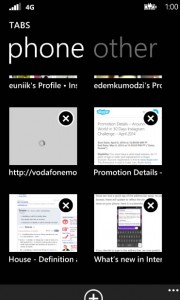
by chrisdofdof | May 22, 2014 | General, Internet, Windows
If you have upgraded your Windows Phone 8.0 using the developers preview program to 8.1 you’ll realize as part of the significant changes in the OS Internet Explorer had its share of the update.
The massive upgrade from the IE team is centered on these areas; quick site access, fast and fluid 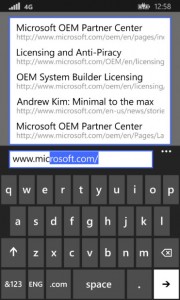 browsing, safety and privacy, and accessibility.
browsing, safety and privacy, and accessibility.
You’ll notice the ease with which you can now access a website with the upgraded frequent sites and url predictions.
The number of multi-tabs you can open has also been increased from the previous allowed six to as many as you want opened. Accessing tabs has been made very easy, having it right next to the address bar. The refresh button is also immediately available,
Internet Explorer 11 allows you to sync your browsing data across phone, tablet and PC. This includes your favorites, history, passwords and opened tabs so you can easily pick up from where you left off when you switch devices “finally say goodbye to emailing yourself links!”
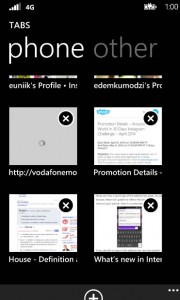
IE updates for windows phone
If you loved live and pinned sites on Windows 8.1 get ready as it’s now available, unlike previously when your pinned favorite blog was a screen shot on your windows phone, you now have rich site icons that update in the background.
Some other upgraded features include In-line video playback, Reading View, Remembering passwords, Swipe to go back and forward just like on a PC or tablet, saving Downloaded files, Safety and privacy (anti-phishing protection with Smart Screen Filter, DoNotTrack signal) InPrivate, DataSense, High Savings Mode (downloads only the most important pieces of the Web site and heavily compresses images) and Accessibility.
Head over to the IE blog for all the detailed updates
What do you think of these updates in the new IE 11 for #WindowsPhone 8.1, we look forward to your thoughts, leave comments below.
Source: IEBLOG
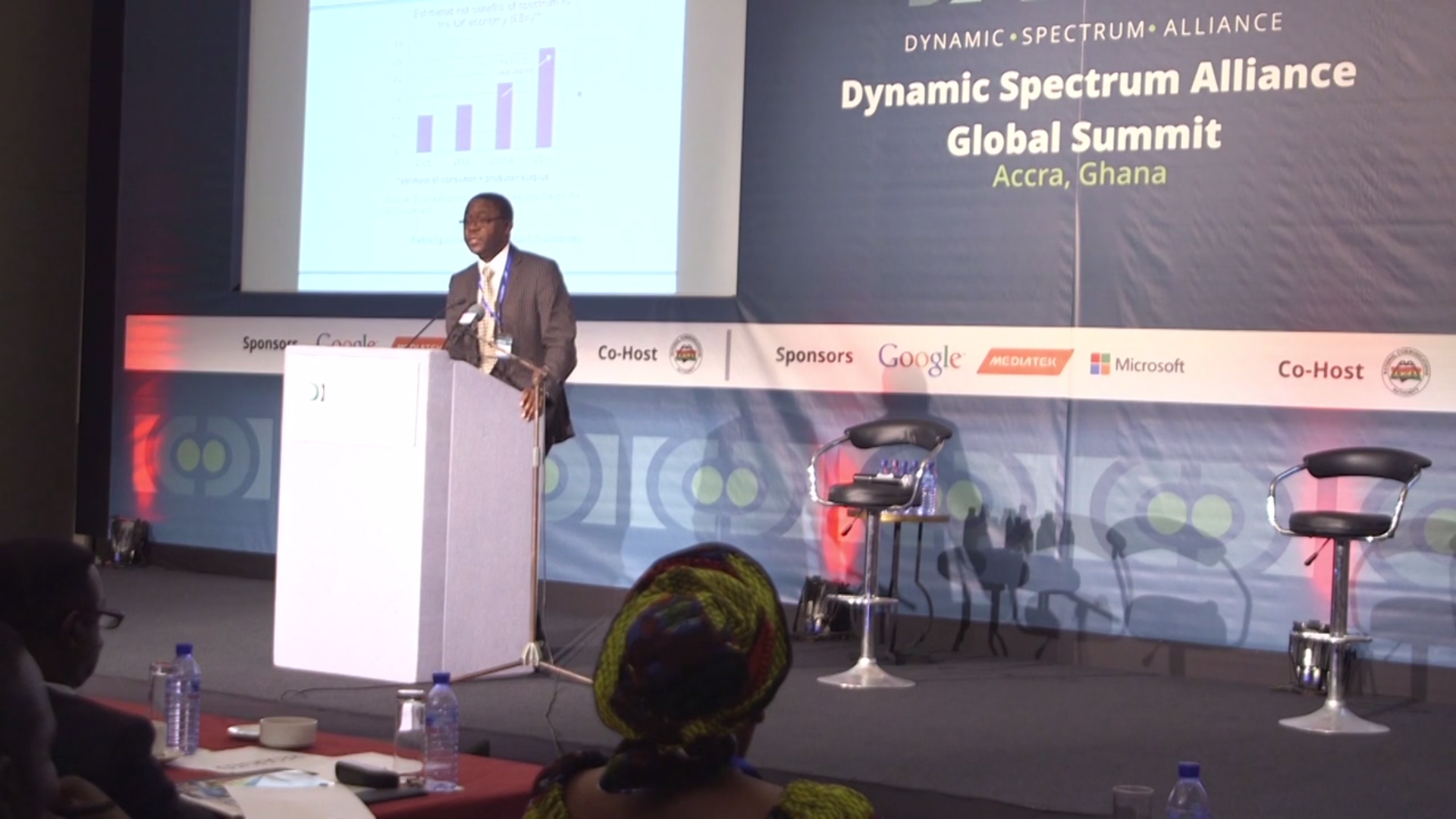
by Sylvester Addo | May 17, 2014 | 4Afrika, General, Internet
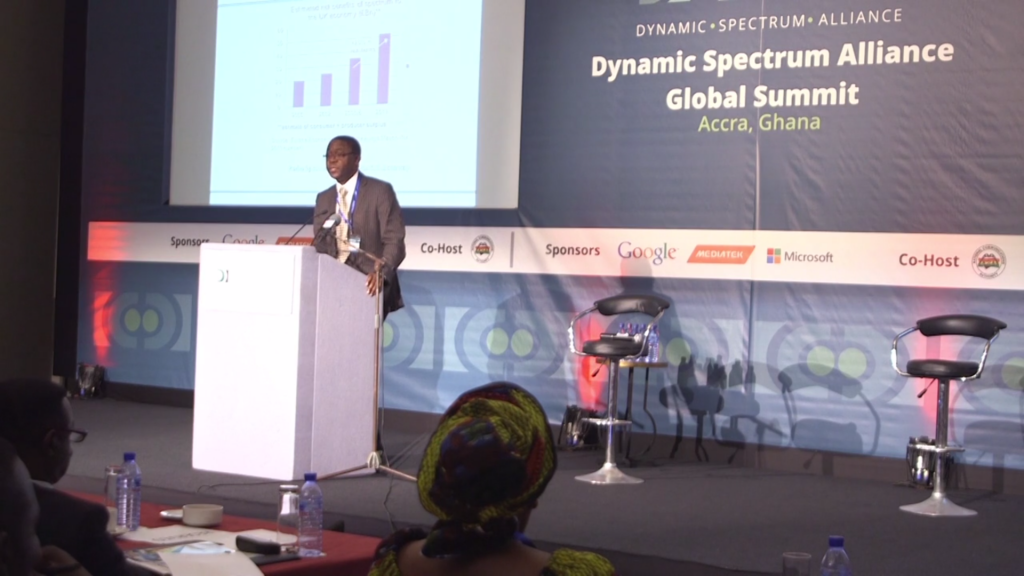
Tuesday May 13th, at the Dynamic Spectrum Alliance Global Summit in Accra, Microsoft Corporation announced new TV white spaces pilot projects on four continents, including the newest project in Koforidua, Ghana, in partnership with SpectraLink Wireless and Facebook said Paul Garnett, Microsoft’s Technology Policy Group Director at the summit.
Paul says TV white spaces, which are the unused frequencies in the wireless spectrum band dedicated to television, are “widely seen as the first opportunity to enable wireless devices to opportunistically tap into unused spectrum, better use of the spectrum could translate to cheaper, more ubiquitous and higher-bandwidth wireless broadband connectivity.”
Microsoft is currently involved in pilot projects in 10 countries, spanning four continents. To learn more, read Garnett’s full post on Microsoft on the Issues.
TV white spaces, the unused portions of wireless spectrum in the frequency bands generally set aside for television transmissions, can be utilized for a range of applications including the following:
• Providing low-cost connectivity
• Connecting rural areas to broadband
• Improving in-building wireless networks
• Creating hotspots for Internet access
• Offloading mobile traffic
Microsoft’s commercial partnership with SpectraLink Wireless and research partnership with Facebook will deploy wireless networks covering entire campuses at All Nations University College and Koforidua Polytechnic. This pilot is part of Microsoft’s 4Afrika Initiative to help improve the continent’s global competitiveness. A core goal of the 4Afrika Initiative is to facilitate access to technology for the masses and to empower African students, entrepreneurs, developers and others to become even more active global citizens.
For students and faculty at the universities, access to the network will be coupled with productivity and communications applications as well as Internet-enabled devices. The networks will use TV white space-enabled radios and other wireless technologies to connect campus buildings, as well as off-campus hostels where students live, to ensure they have access to fast broadband. The project is operating under a TV white space pilot license granted by the Ghana National Communications Authority and is the only TV white space license currently issued in West Africa.
Facebook’s main involvement in the project will be to collaborate with Microsoft and SpectraLink Wireless on joint technology research to better understand how TV white space spectrum and equipment can support wireless Internet users today. These efforts will be led by Facebook’s Connectivity Lab team, who are working on new technologies to support Internet.org’s mission to make Internet access available to the two-thirds of the world not yet connected.
Facebook, Microsoft and SpectraLink Wireless have a like-minded view that a more abundant supply and flexible use of spectrum are important aspects to affordably connect more people to the Internet, and the companies plan to collaborate on the policy front. All three companies involved in this pilot project are also members of the Dynamic Spectrum Alliance — a global, cross-industry alliance focused on increasing dynamic access to unused radio frequencies.
“TV white spaces technology, when combined with other low-cost wireless technologies, such as Wi-Fi, offers a substantial opportunity for businesses, consumers and governments around the world to improve the economics of broadband network deployment and service delivery”, “Through these projects worldwide, we are working with local private and public-sector partners to enable new consumer experiences, while encouraging governments to make needed legal and regulatory changes to allow this technology to be deployed more broadly” said Paul Garnett.
SpectraLink Wireless: Ghana TV White Spaces Pilot from Plastic Buddha Productions on Vimeo.
“This project will provide substantial benefit to students and faculty at the universities, until now, students at these universities have not had consistent access to fast broadband, which is key to students’ ability to access information and learning resources online and compete in the 21st-century economy. With SpectraLink Wireless’ Edutech-as-a-Service platform, students and faculty will have access to the best productivity applications on the market and Internet access at true broadband speeds. All at a low cost per user per month. We look forward to rolling this out in Koforidua and the rest of the country.” said John Sarpong, CEO of SpectraLink Wireless.
Africa is not the only region where the company’s white spaces pilots are flourishing. In Asia, Microsoft has helped to pioneer white spaces pilots in Singapore and the Philippines. Microsoft was announced as a founding member of Taiwan’s Dynamic Spectrum Access Pilot Group, which aims to contribute to the creation and development of a world-leading dynamic spectrum access ecosystem in Taiwan, leveraging Taiwan’s tremendous capabilities in semiconductor design and fabrication, component and devices manufacturing, and systems integration and solutions.
The group includes leading Taiwanese companies, academic and research institutions, as well as Mediatek, the Communications Research Center at the National Taiwan University, and the Taiwan Institute for Information Industry. All are members of the Dynamic Spectrum Alliance as well. The group will conduct pilot projects in Taiwan for both rural broadband access and Internet of Things (IoT) applications, such as Smart Grid, using TV white space radios.
Dynamic Spectrum Alliance is a global organization advocating for laws and regulations that will lead to more efficient and effective spectrum utilization, DSA would contribute to discussions about innovative ways of managing limited radio spectrum resources, including dynamic spectrum access.
Dynamic spectrum access describes a family of emerging wireless technologies that can use radios frequencies more efficiently, thereby increasing the availability and reducing the cost of wireless bandwidth. Following successful trials utilizing one form of dynamic spectrum access – transmitting on unused TV channels (TV White Spaces) – in selected locations in Accra, Ghana,( Meltwater Entrepreneurial School of Technology, MEST) deployments will soon take place at targeted tertiary Ghanaian institutions, including the Koforidua Polytechnic and All Nations University College.
By utilizing TV White Space-enabled radios from radio manufacturer 6Harmonics that connect campus buildings spaced far apart as well as off-campus hostels, the entire university campus including students and faculty members will be able to enjoy an always-on high-speed Internet service.
SpectraLink Wireless is an Internet service provider setup in Ghana focused on making broadband access affordable. The company is going to market under its DjungleWiFi brand with Edutech-as-a-Service platform targeting universities in the West and Central African regions.
SpectraLink Wireless, through its consumer brand djungleWiFi sponsored free Wi-Fi access for all conference participants during the DAS global summit. A Wi-Fi network was deployed on site, and uses white space radios as the backhaul technology providing fast Internet service.









